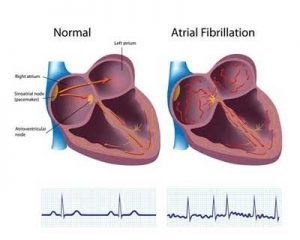- Home
- Editorial
- News
- Practice Guidelines
- Anesthesiology Guidelines
- Cancer Guidelines
- Cardiac Sciences Guidelines
- Critical Care Guidelines
- Dentistry Guidelines
- Dermatology Guidelines
- Diabetes and Endo Guidelines
- Diagnostics Guidelines
- ENT Guidelines
- Featured Practice Guidelines
- Gastroenterology Guidelines
- Geriatrics Guidelines
- Medicine Guidelines
- Nephrology Guidelines
- Neurosciences Guidelines
- Obs and Gynae Guidelines
- Ophthalmology Guidelines
- Orthopaedics Guidelines
- Paediatrics Guidelines
- Psychiatry Guidelines
- Pulmonology Guidelines
- Radiology Guidelines
- Surgery Guidelines
- Urology Guidelines
ECG not recommended for screening AF - USPSTF

The U.S. Preventive Services Task Force does not endorse electrocardiography (ECG) screening to detect atrial fibrillation or to prevent cardiovascular disease events in a pair of draft recommendation statements.
Cardiovascular disease (CVD), which can lead to heart attack and stroke, is the leading cause of death for adults in the United States. The U.S. Preventive Services Task Force (Task Force) today posted two draft recommendation statements and draft evidence reviews related to CVD: the use of ECG to screen for CVD risk and ECG to screen for atrial fibrillation (AFib).
Screening for CVD risk:
Screening for CVD risk is traditionally based on factors such as age, race/ethnicity, sex, obesity, diabetes, smoking status, cholesterol levels, and blood pressure. The Task Force reviewed the evidence on whether adding resting or exercise ECG, a test that records the electrical activity of a person’s heart, to this traditional set of risk factors can improve clinicians’ ability to assess risk for and prevent heart attack and stroke. Based on its review, the Task Force found that there is insufficient evidence to recommend for or against ECG screening in adults at intermediate or high risk of heart attack or stroke. This is an I statement.
- The Task Force also found that people at low risk of heart disease or stroke should not be screened with ECG because the harms from screening are equal to or greater than the benefits. This is a D recommendation (Not recommended).
“The evidence shows that people at low risk of CVD do not benefit from screening with ECG,” says Task Force member Seth Landefeld, M.D. “For patients with elevated risk levels, clinicians should continue to use traditional risk factors to assess CVD risk and guide treatment until more evidence is available.”This draft recommendation statement updates and is consistent with the 2012 final recommendation statement.
Screening for AFib With ECG Separately
The Task Force reviewed the evidence on whether screening for AFib with ECG is an effective way to help diagnose AFib earlier and prevent strokes in older adults with no signs or symptoms. Based on this review, the Task Force found that there is insufficient evidence to determine if the benefits of screening for AFib with ECG outweigh the harms. This is an I statement.
AFib affects nearly 3 million Americans and sometimes is not detected until after someone has a stroke. It is a kind of arrhythmia, a problem with the rate or rhythm of the heartbeat. It occurs when the two upper chambers of the heart beat rapidly and irregularly and do not move all the blood to the lower chambers of the heart. When this happens, a blood clot can form and potentially lead to a stroke.“We need more research to determine whether screening for AFib with ECG can help prevent strokes,” Says Task Force member Alex Krist, M.D., M.P.H. “Trials in people without signs or symptoms of AFib that compare screening with ECG to usual care will help fill this research gap.”
In a separate statement, the task force recommends against screening with resting or exercise ECG to prevent CVD events in low-risk, asymptomatic adults (grade D). But the group concludes that evidence is lacking to make a determination for or against such screening in adults with intermediate or high risk (grade I). These are in line with the group's 2012 recommendations.

Disclaimer: This site is primarily intended for healthcare professionals. Any content/information on this website does not replace the advice of medical and/or health professionals and should not be construed as medical/diagnostic advice/endorsement or prescription. Use of this site is subject to our terms of use, privacy policy, advertisement policy. © 2020 Minerva Medical Treatment Pvt Ltd